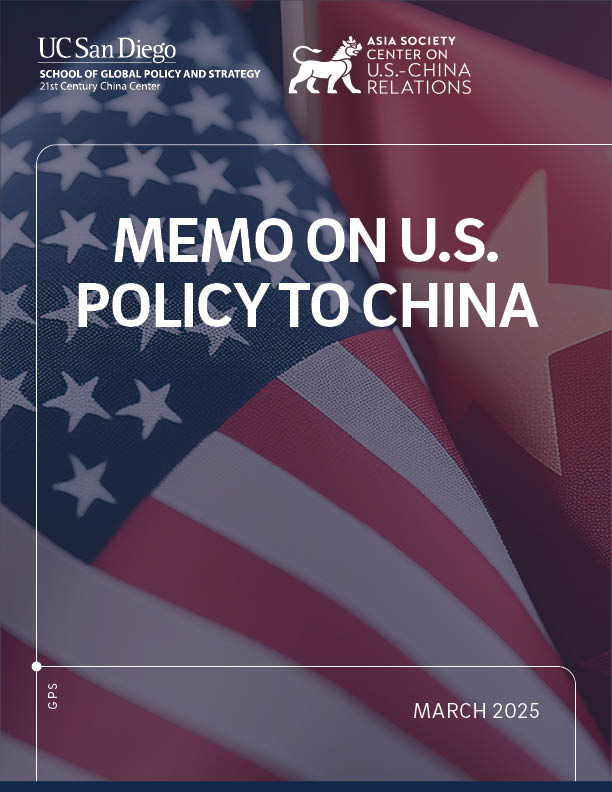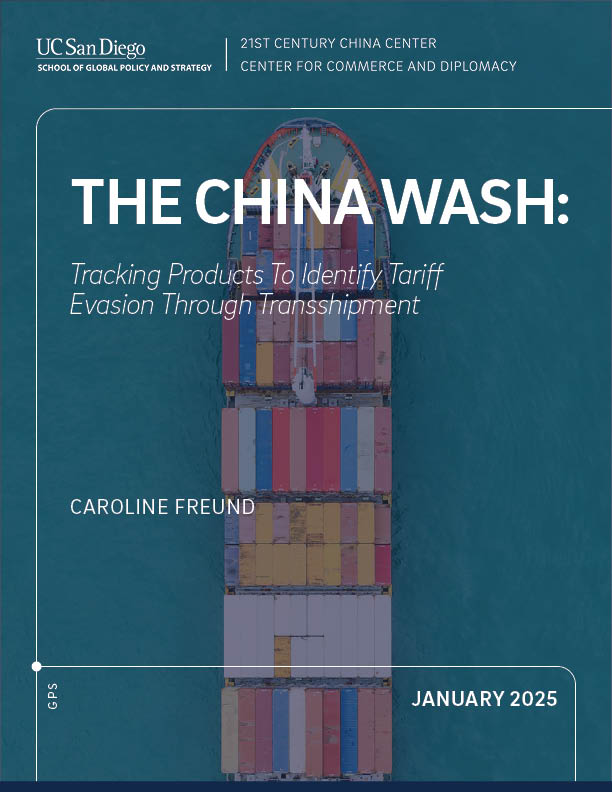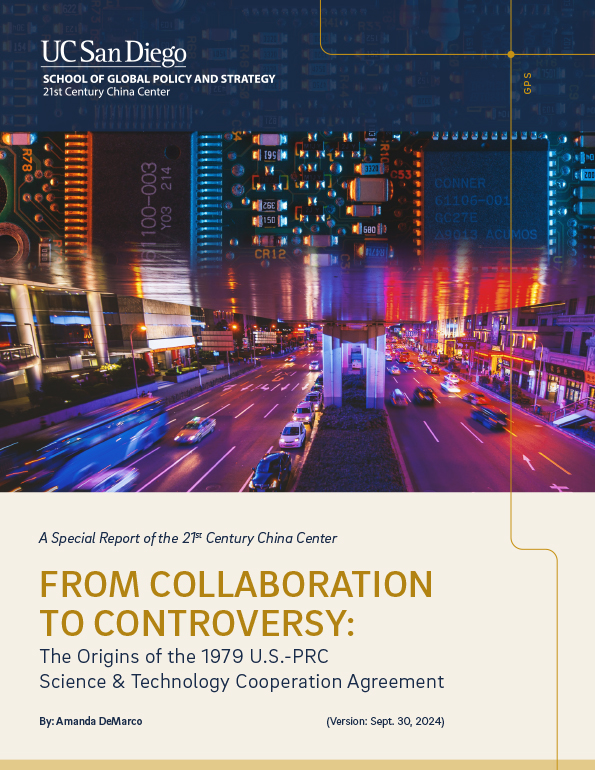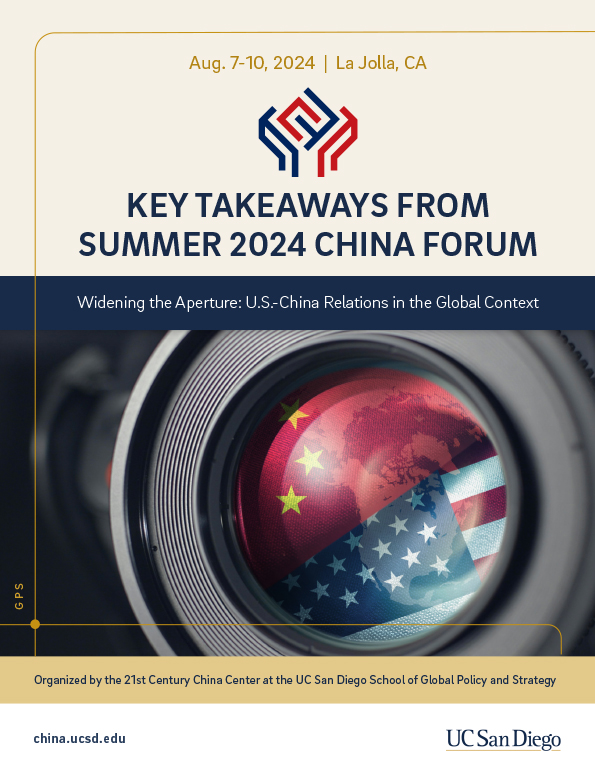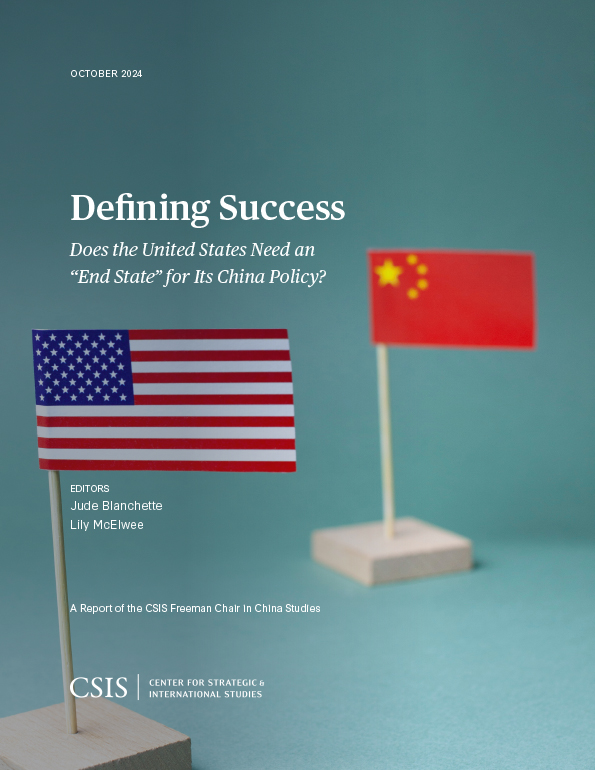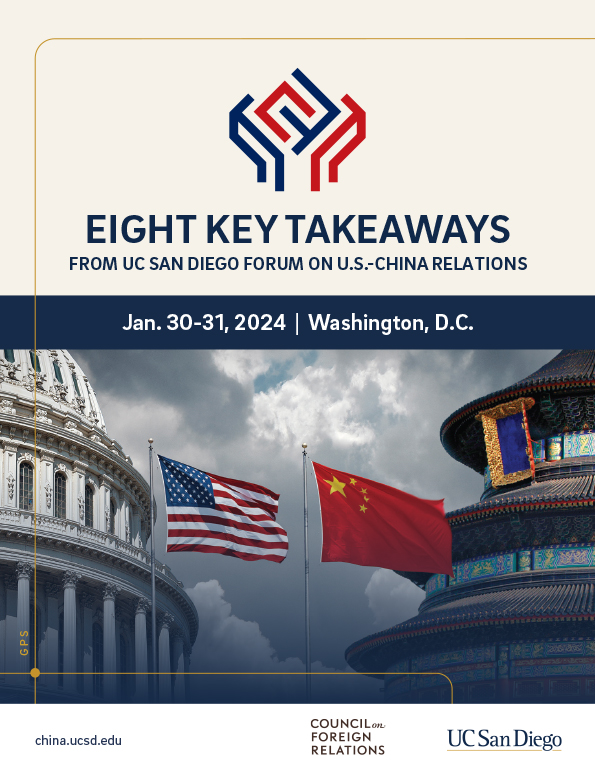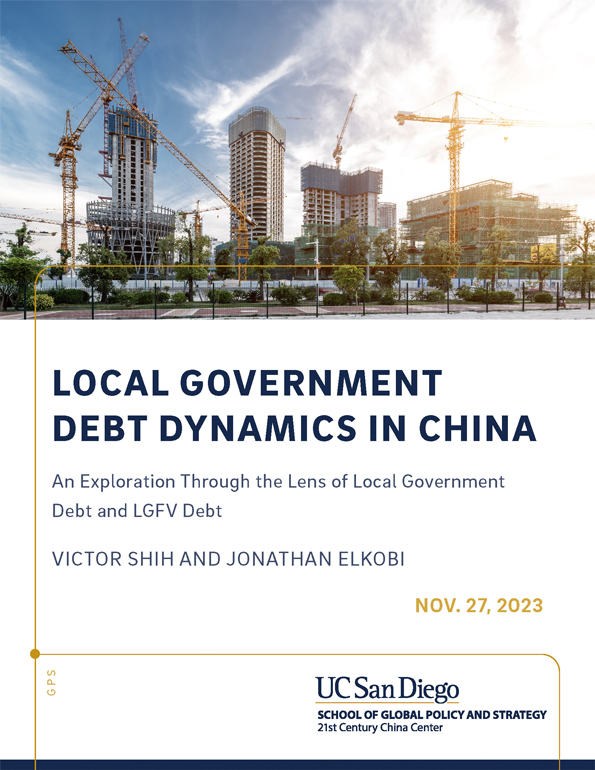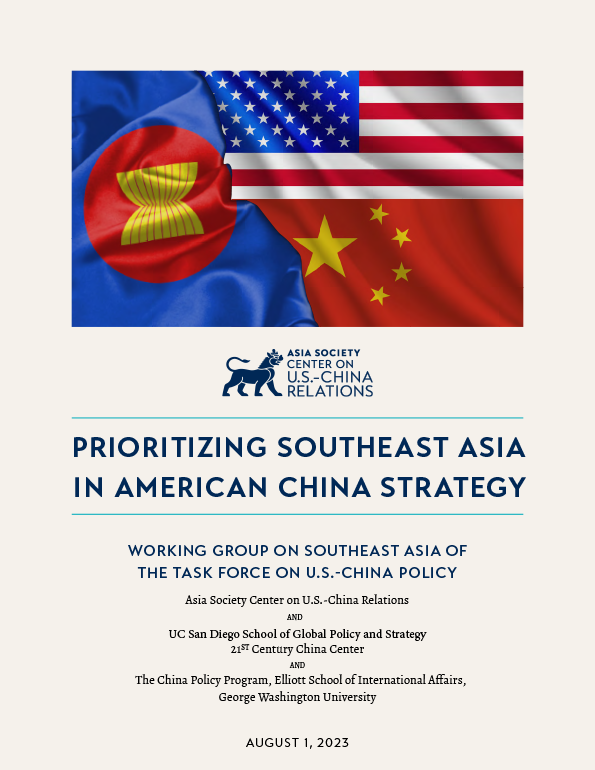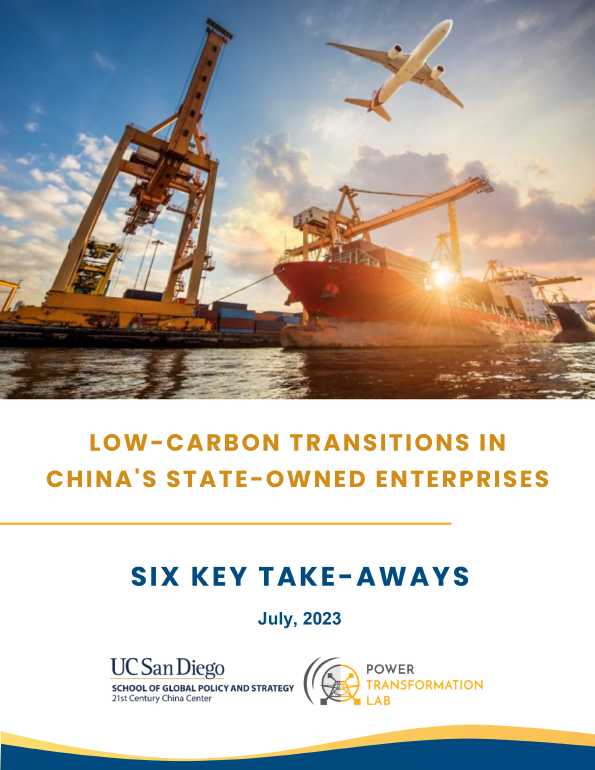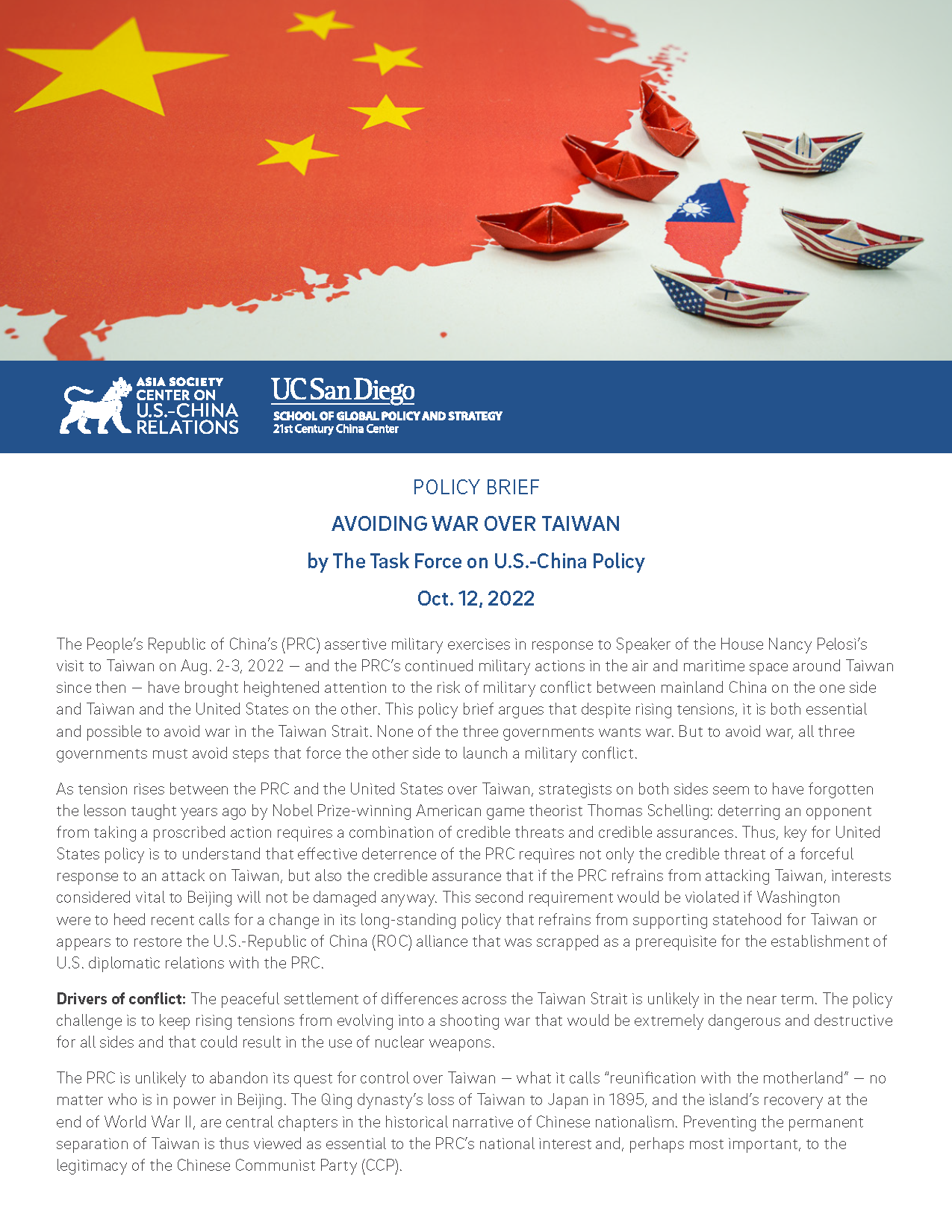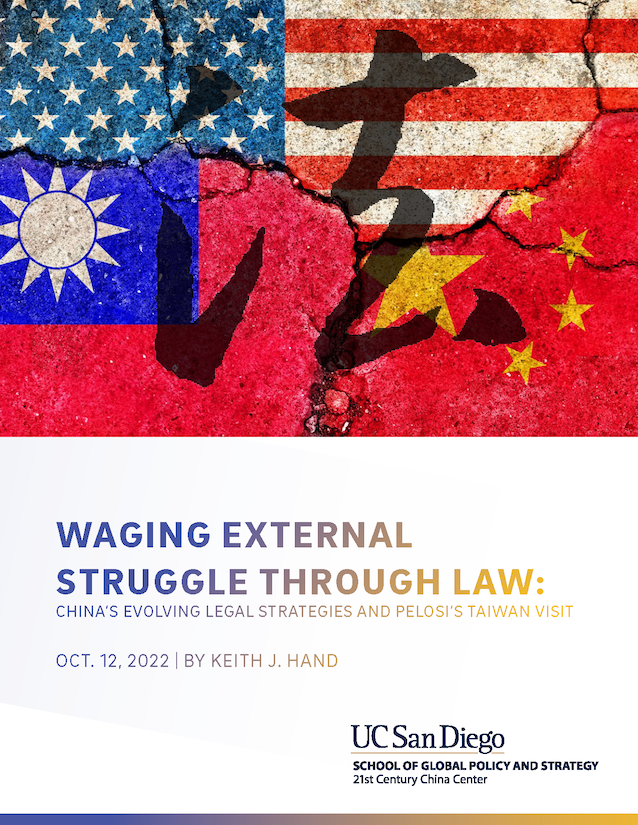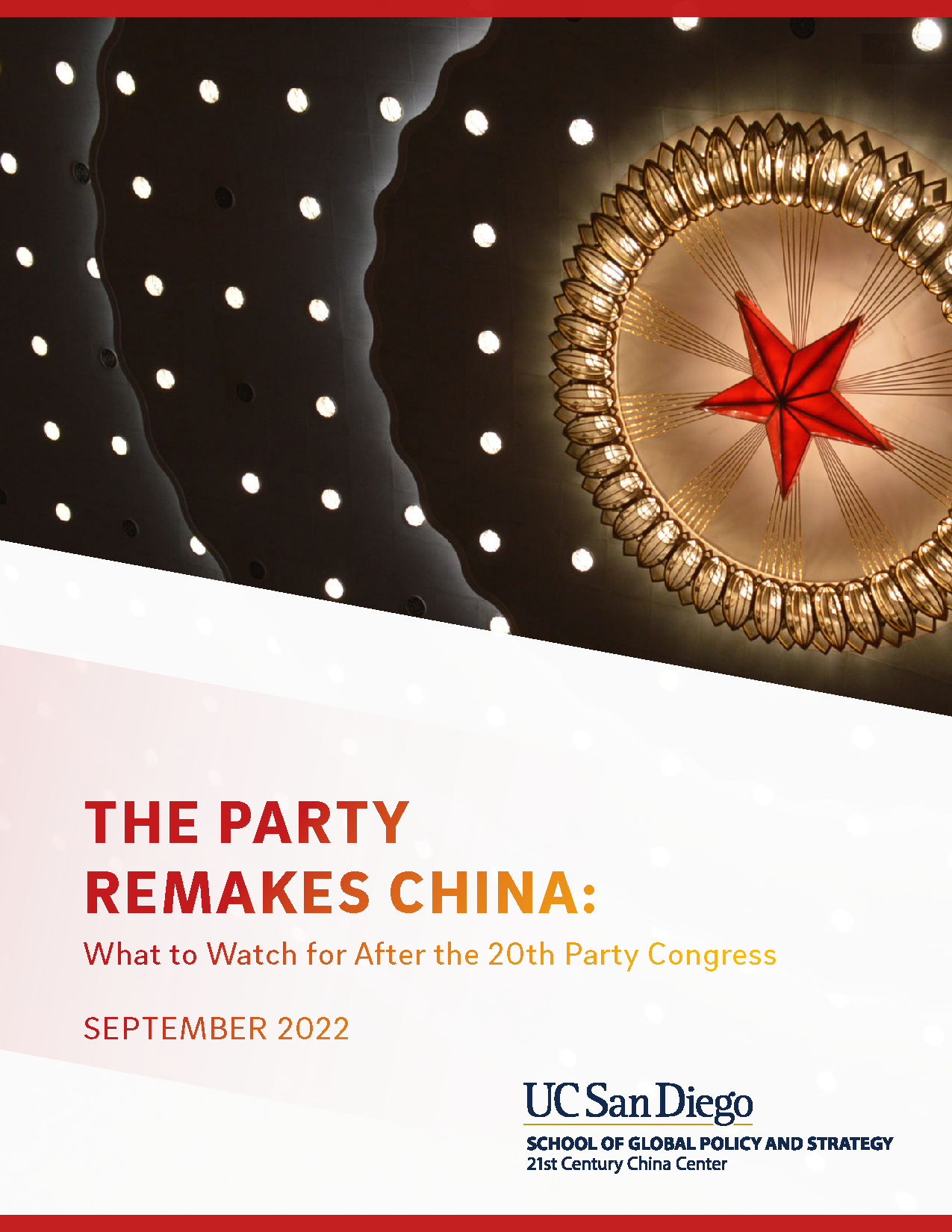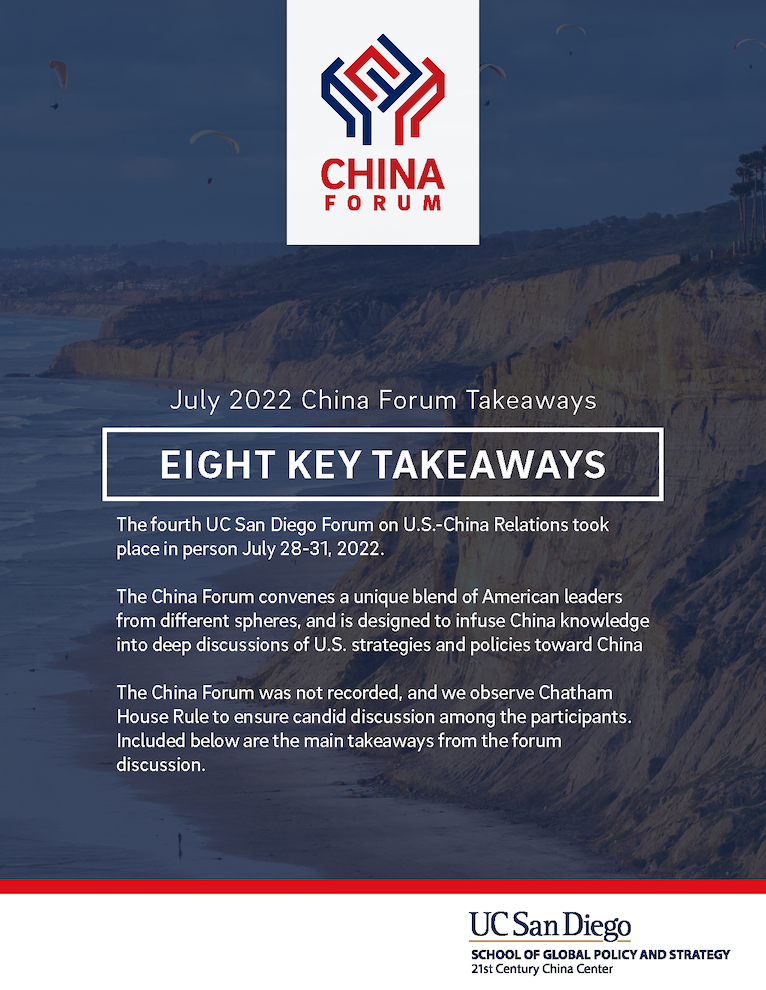Policy Reports
Special Reports
2025 Workshop on Low-Carbon Transitions in Chinese State-Owned Enterprises
These five key takeaways represent significant points made during the discussion at the "Workshop on Low-Carbon Transitions in Chinese SOEs" held on June 6-7, 2025.
San Diego Workshop on Climate and U.S.-China Relations – May 2025
On May 9–10, 2025, leading scholars, policy experts, and practitioners gathered for a workshop exploring how intensifying U.S.-China geopolitical rivalry is reshaping opportunities and challenges for climate collaboration, technology deployment, and supply chain resilience. Through six thematic panels, participants examined climate policy developments across major economies—highlighting issues from green industrial strategy and clean energy investment to data security and critical minerals. A central takeaway: competition in green technology is here to stay, making it essential to manage geostrategic tensions through clearer national security guidelines, mutual understanding of industrial policy impacts, and engagement through subnational, academic and industry channels.
UC San Diego China Forum Takeaways – August 2025
This report summarizes the key insights from the Summer 2025 China Forum at UC San Diego, hosted by the 21st Century China Center at the School of Global Policy and Strategy.
What Have We Learned from the Past 25 Years of U.S. Economic Policy on China?
Dr. Lael Brainard, former Treasury official, vice chair of Federal Reserve (2022-2023) and director of National Economic Council (2023-2025), breaks down major factors in the U.S.'s economic policy towards China in the annual Susan Shirk Lecture on U.S. China Relations at this 2025 UC San Diego China Forum.
Memo on U.S. Policy to China
This memo on optimizing U.S. policy toward China is the result of multiple rounds of discussion among participants of The Task Force on U.S.-China Policy. Compiled by Susan Shirk, Research Professor and Director Emeritus of the 21st Century China Center, and Rick Waters, Senior non-resident fellow at the Asia Society, this memo the policy does not represent a formal consensus statement signed by Task Force members. Instead, it provides a distillation and synthesis of key insights from their extensive discussions.
The China Wash: Tracking Products to Identify Tariff Evasion Through Transshipment
This brief develops a new methodology to estimate transshipment of Chinese goods through third countries to the U.S. following the 2018 tariff hike. A specific good is considered transshipped if there is a tariff, if the country increases imports from China and replaces China in the U.S. market, and if China is expanding more rapidly in other markets. Transshipment is estimated to rise to 7.5 percent of the value of Vietnam’s exports in 2020 and then begin to decline. In contrast, the share of transshipment from China through Mexico rises over time but never exceeds 1.5 percent of Mexico’s exports to the U.S. By the end of the period, for each country, transshipment is estimated to be about $5 billion, implying that roughly $1.25 billion in revenue was avoided. Other countries, such as Singapore and Thailand, also record transshipment.
Low-Carbon Transitions in Chinese State-Owned Enterprises
These five key takeaways represent significant points made during the discussion at the "Workshop on Low-Carbon Transitions in Chinese SOEs" held on April 12-13, 2024.
From Collaboration to Controversy: The Origins of the 1979 U.S.-PRC Science & Technology Cooperation Agreement
The U.S.-China Science and Technology Agreement (STA) is pending renewal and faces potential discontinuation. In this special report, Amanda DeMarco traces the origins of the STA, seeking answers to how this once mutually beneficial treaty ended up in limbo. What has changed in each side's perception of the STA? Should the U.S. renew or abandon it?
China Forum Takeaways – 2024 Summer
This report summarizes the key insights from the Summer 2024 China Forum at UC San Diego, hosted by the 21st Century China Center at the School of Global Policy and Strategy. The event brought together 80 experts in August to discuss the evolving global landscape and its impact on U.S.-China relations. It opened with a keynote speech by Fareed Zakaria, host of Fareed Zakaria GPS, in which he outlined a new path for U.S.-China relations. Over two days, Democrats and Republicans engaged in discussions beyond bilateral concerns, focusing on China’s internal challenges and global realignments. Debates touched on the future of China’s economy, U.S. strategy, and the long-term goals of U.S. policy. Small group sessions worked to define key elements of a bipartisan U.S. approach toward China.
Defining Success Does the United States Need an “End State” for Its China Policy?
This essay, authored by Susan Shirk, director emeritus of the 21st Century China Center, is a recent contribution to a report by the Center for Strategic and International Studies (CSIS). The report gathers insights from over 20 leading scholars from the U.S. and its allies and partners, addressing the ongoing debate between an "end state" versus a "steady state" approach in U.S.-China relations. The core issue is whether a clear, well-defined endpoint is necessary or if a more flexible, adaptable strategy should be adopted to manage the complexities of what is likely to be a continuously evolving rivalry and relationship.
China Forum Takeaways – 2024 Winter
The center partnered with the Council on Foreign Relations to hold a special two-day forum in Washington, D.C. from Jan. 30-31, 2024. The proceedings commenced with a public address by Jake Sullivan, national security advisor to President Biden, who focused on the implementation of U.S. China strategies and key considerations for 2024. Subsequent closed-door sessions delved into five topics, such as the role of Congress in U.S.-China relations, the status of the Chinese economy, recent developments in China’s domestic politics, the post-election landscape in Taiwan, and the costs and benefits of derisking for the U.S. and global economy. The main takeaways from the 2024 winter forum are outlined.
Local Government Debt Dynamics in China
By collecting data on all bonds issued by local governments and local government financing vehicles, this paper documents the relentless rise of local government debt in China, which has increased by over 3.5-fold since 2017. For 12 of China’s provinces, average monthly debt servicing, which combines bond maturity and interest payments, has surpassed 100% of monthly provincial revenue. For another 15 provinces, debt servicing has surpassed 50% of monthly revenue. This debt is increasingly a drag on growth and an accelerant for regional inequality, which will require substantial intervention from the central government to resolve.
Prioritizing Southeast Asia in American China Policy
This is a 2023 report by the Task Force on U.S.-China Policy’s Working Group on Southeast Asia, led by Task Force member David Shambaugh from George Washington University. The report lays out reasons why Southeast Asia is a critically important for U.S. interests and U.S. competition with China. It gives recommendations for U.S. policy both from the perspective of the Working Group’s Southeast Asian dialogue partners, and from the Working Group itself.
Low-Carbon Transitions in Chinese State-Owned Enterprises
These six key takeaways represent significant points made during the discussion at the "Workshop on Low-Carbon Transitions in Chinese SOEs" held in July 2023.
Avoiding War Over Taiwan
This new policy brief, cosigned by 14 members of the Task Force on U.S.-China Policy convened by Asia Society’s Center on U.S.-China Relations and the center, argues that it is both essential and possible to avoid war in the Taiwan Strait by bolstering deterrence through enhancing the credibility of both our assurances and threats.
Waging External Struggle Through Law: China’s Evolving Legal Strategies and Pelosi’s Taiwan Visits
This policy report by Keith J. Hand highlights key developments in the People's Republic of China's legal strategies to enhance its ability to apply coercive pressure in external conflict and competition, with particular focus on PRC-Taiwan-U.S. relations.
The Party Remakes China: What to Watch for After the 20th Party Congress
This policy report on the 20th Party Congress represents the combined efforts of 21st Century China Center scholars. Within, we connect elite politics to hard data and to larger trends in policy and politics, mapping potential courses of Xi Jinping's third term. (Video)
China Forum Takeaways
We’ve compiled a list of eight key takeaways from our latest gathering of the UC San Diego Forum on U.S.-China Relations in July 2022. You can check out what the participants have to say on China’s involvement with Russia and Ukraine, its plans for Taiwan, and domestic challenges in both China and the U.S.
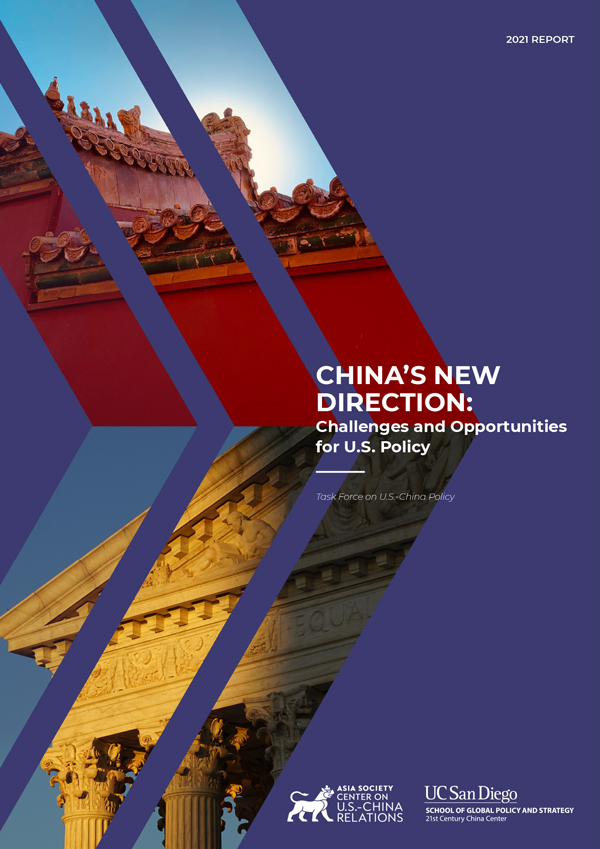
China’s New Direction: Challenges and Opportunities for U.S. Policy
This special report was assembled by the Task Force on U.S.-China Policy convened by the Asia Society’s Center on U.S.-China Relations and the UC San Diego School of Global Policy and Strategy's 21st Century China Center. The 21 leading U.S. experts on China weigh in with insights on major changes in China and provide a series of research-informed policy recommendations on eight topics critical to U.S.-China relations going forward.
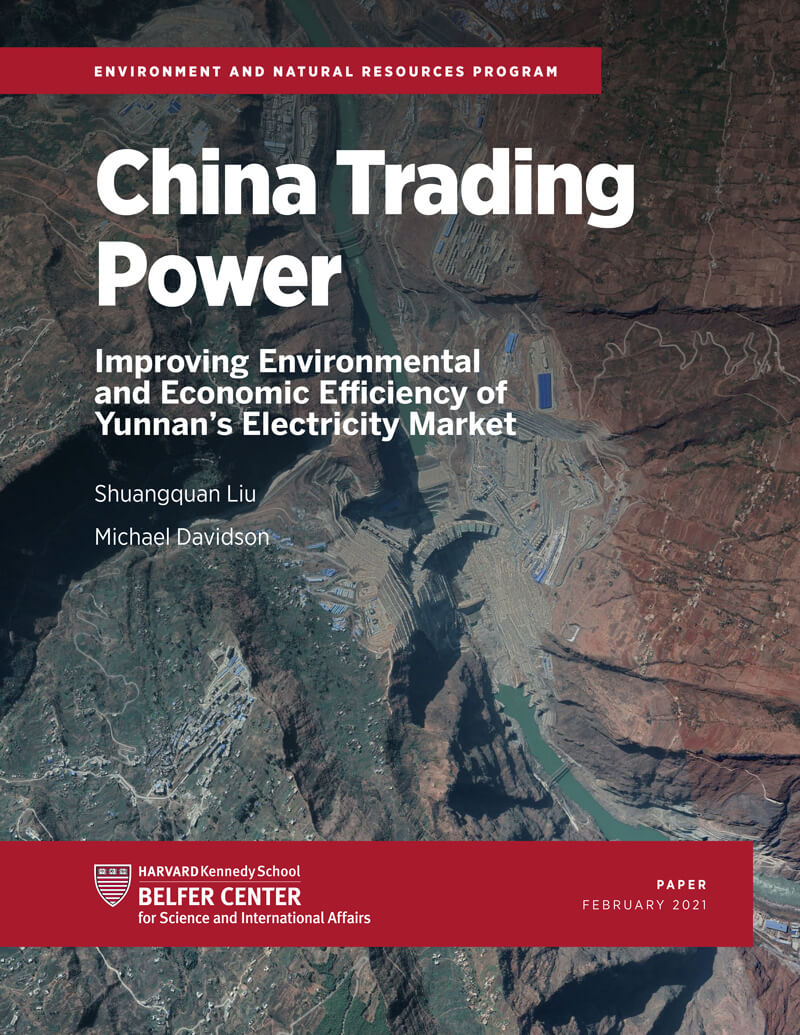
China Trading Power: Improving Environmental and Economic Efficiency of Yunnan’s Electricity Market
This study investigates China's claim that nuclear energy is necessary to meet its growing energy demands by analyzing China's energy alternatives and assessing their likelihood of contributing to total Chinese capacity. By looking at China's transformative energy policy from several perspectives, this study finds that nuclear energy is indeed a necessity for China.
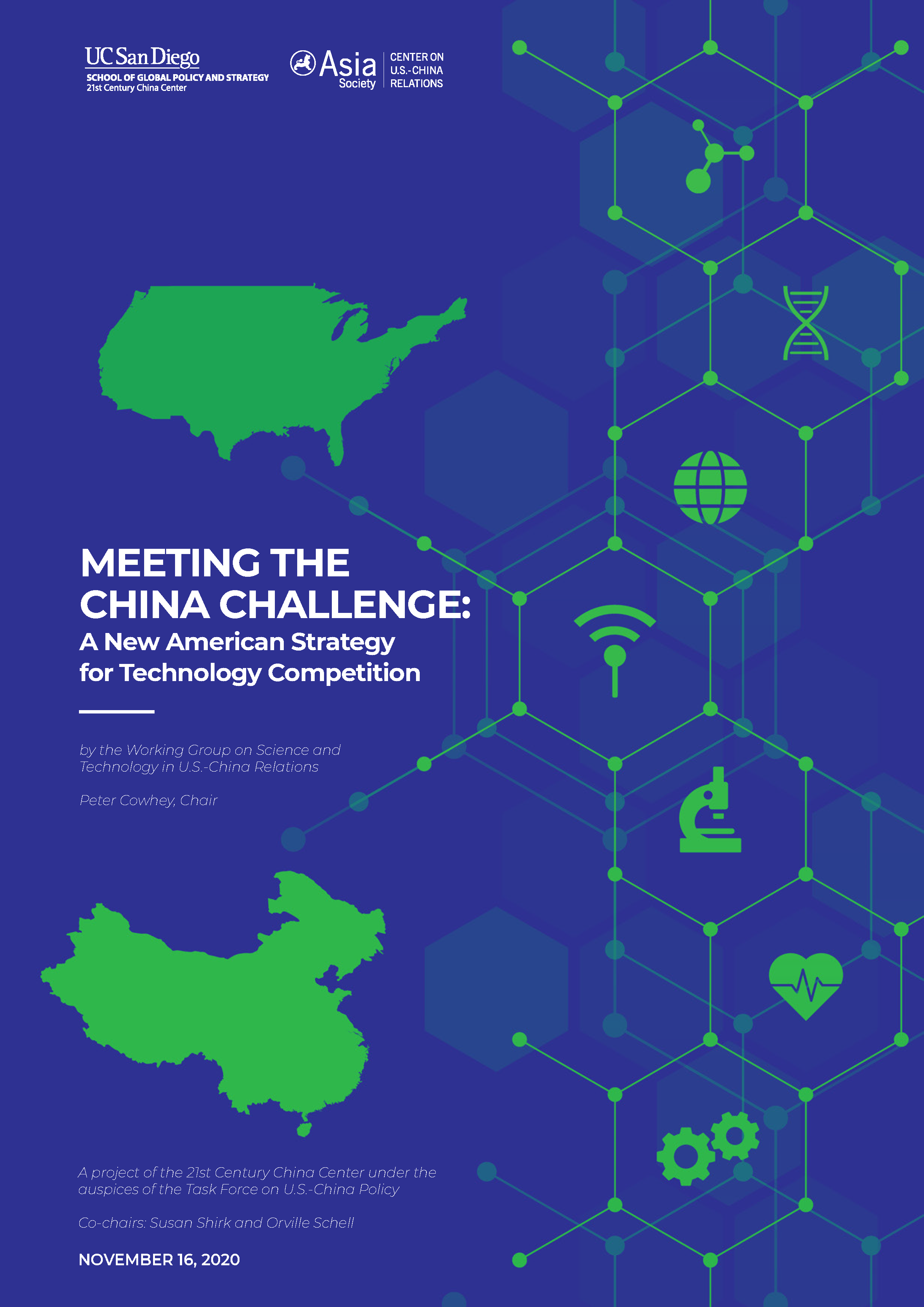
Meeting the China Challenge: A New American Strategy for Technology Competition
This policy report is the culmination of over a full year’s deliberation and study by the bipartisan Working Group on Science and Technology in U.S.-China Relations. It sets forth broad policy objectives as well as specific recommendations for the new U.S. administration in four domains of science and technology: fundamental research, 5G digital communications, artificial intelligence and biotechnology.
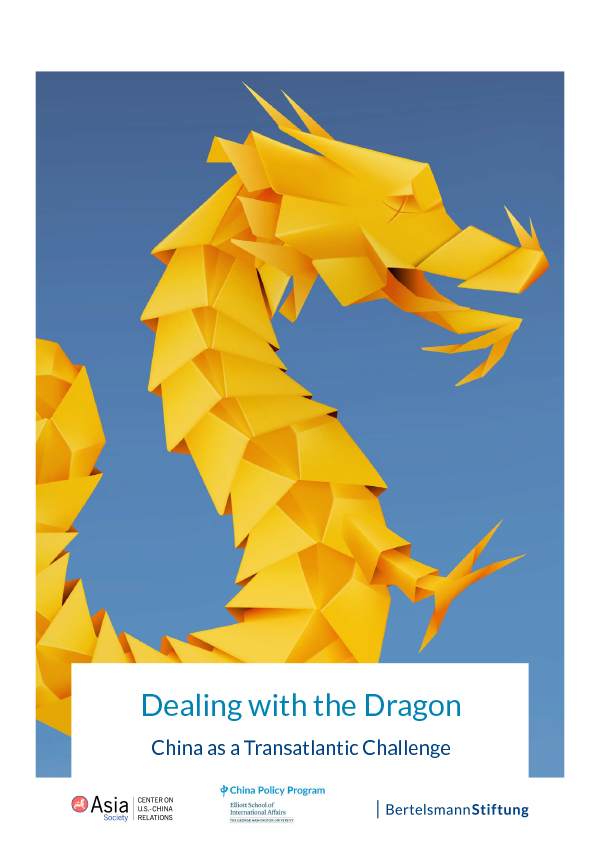
China as a Transatlantic Challenge
This report is the outgrowth of a symposium that brought together 43 of America’s and Europe’s top China experts to identify areas of common interest and divergence across the Atlantic.
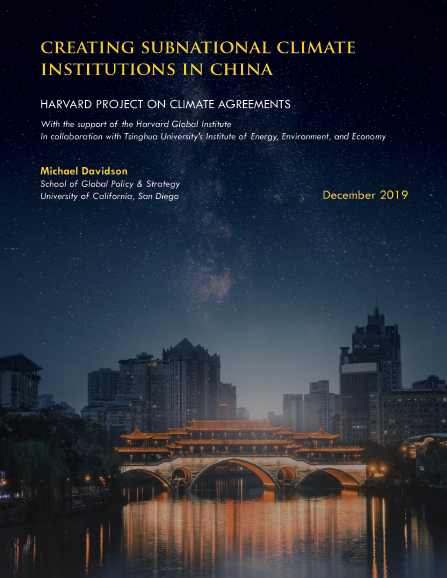
Creating Subnational Climate Institutions in China
Michael Davidson prepared this paper as part of a larger project that the Harvard Project on Climate Agreements is conducting, with support of the Harvard Global Institute, on subnational climate-change policy in China and India. The Harvard Project conducted a research workshop on this topic in July 2019, in collaboration with Tsinghua University’s Institute of Energy, Environment, and Economy.
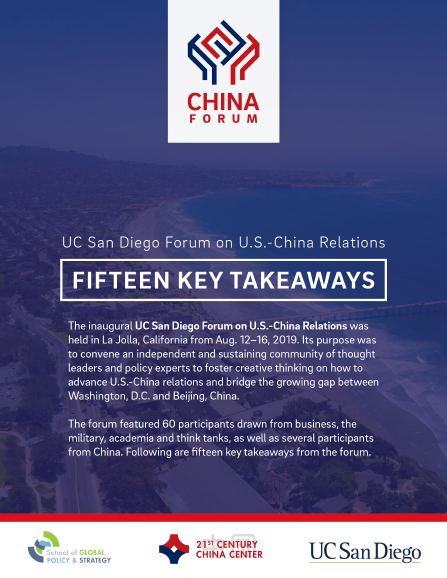
UC San Diego Forum on U.S.-China Relations: Fifteen Key Takeaways
The purpose of UC San Diego Forum on U.S.-China Relations is to convene an independent and sustaining community of thought leaders and policy experts to foster creative thinking on the U.S.-China relations. Here are fifteen key takeaways from the inaugural forum, held in La Jolla, California from Aug. 12–16, 2019.
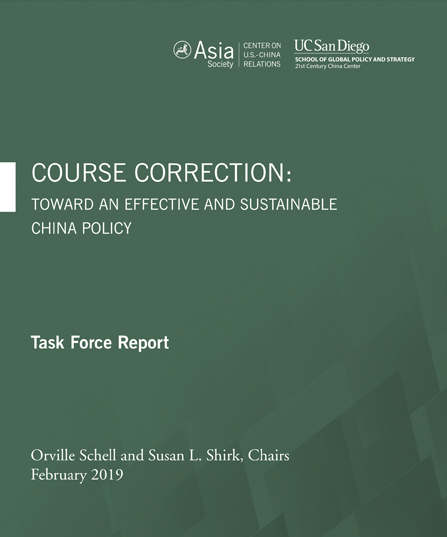
Course Correction: Toward an Effective and Sustainable China Policy
The 21st Century China Center partners with the Asia Society’s Center on U.S.-China Relations to convene a task force consisting of the country’s leading China specialists. The Task Force’s report provides a comprehensive critical review of U.S. policy toward China with recommendations for the Trump administration.
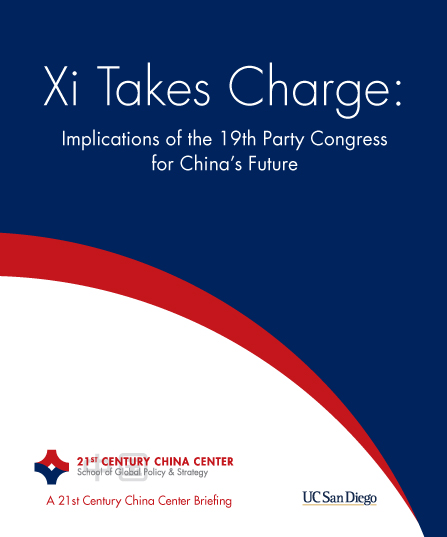
21st Century China Center Briefing on China’s 19th Party Congress
In this briefing, 21st Century China Center scholars provide a timely in-depth analysis of a series of critical questions about President Xi Jinping, the 19th Party Congress and the future of China.
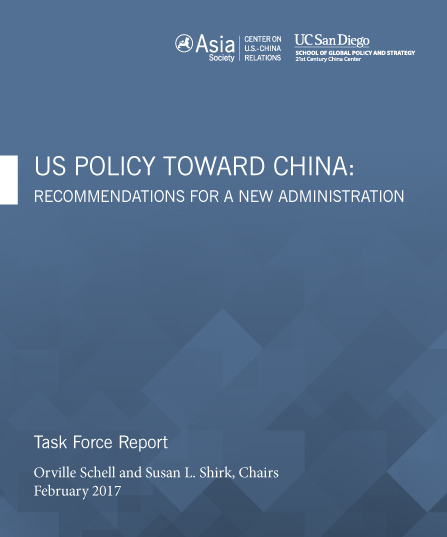
U.S. Policy Towards China: Recommendations for a New Administration
The 21st Century China Center partners with the Asia Society’s Center on U.S.-China Relations to convene a task force consisting of the country’s leading China specialists, many of whom have served under both political parties and every U.S. president since the Nixon administration. The Task Force’s first report provides a comprehensive critical review of U.S. policy toward China with recommendations for the Trump administration.
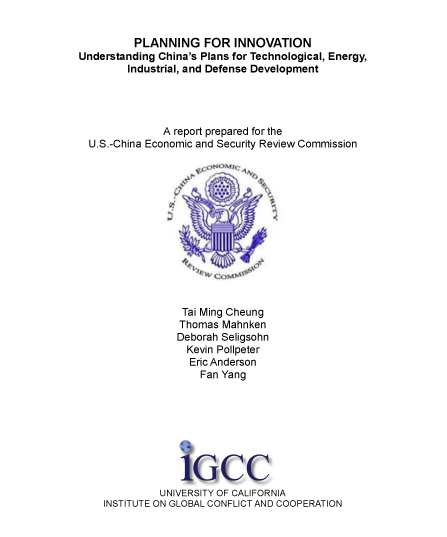
Understanding China’s Plans for Innovation & Technology
This report is co-authored by Tai Ming Cheung and his colleagues from the UC Institute on Global Conflict and Cooperation Thomas Mahnken, Deborah Seligsohn, Kevin Pollpeter, Eric Anderson and Fan Yang. It provides an assessment of China’s state plans for civilian and defense-related science and technology, industrial and energy development and their economic and security implications for the United States.
Future of U.S.-China Energy Relations
The American EV Transition: Looking Ahead While Lagging Behind
This policy brief finds that the United States lags far behind China in EV adoption due to affordability and infrastructure constraints, and it uses comparative market analysis to identify structural barriers and recommend coordinated policy and industry strategies to sustain U.S. automotive competitiveness.
Managing Data Security in Foreign Direct Investment Flows for Electric Vehicles
In this policy brief, Peter Cowhey explores how foreign direct investment in electric vehicles and batteries could help address key challenges in global green supply chains. It examines the growing importance of data security and sovereignty in EV technology and highlights Tesla’s agreement with Chinese regulators as a potential model for managing cross-border technological interdependence.
Policy Analysis
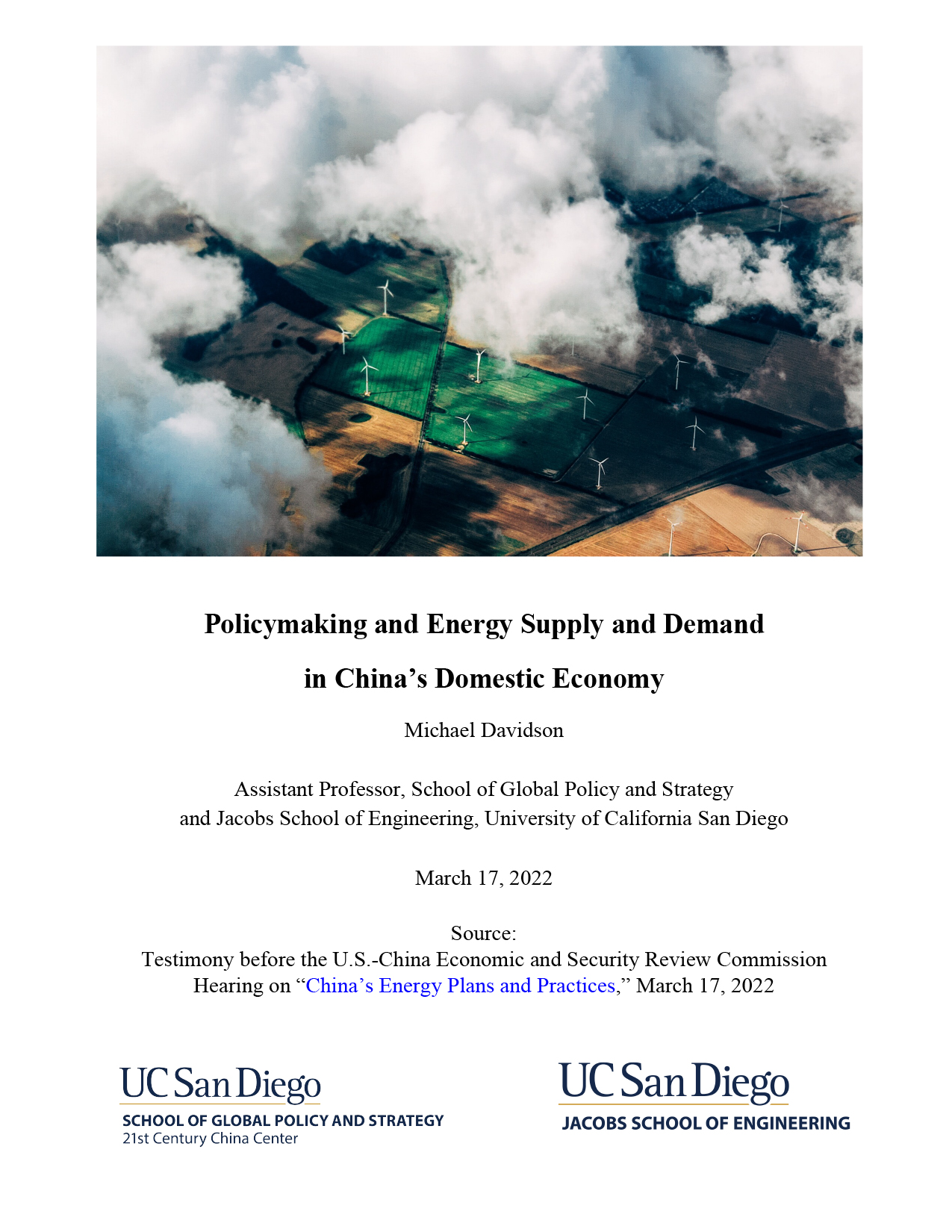
Policymaking and Energy Supply and Demand in China’s Domestic Economy
Michael Davidson's testimony before the U.S.-China Economic and Security Commission hearing on "China's Energy Plans and Practices"
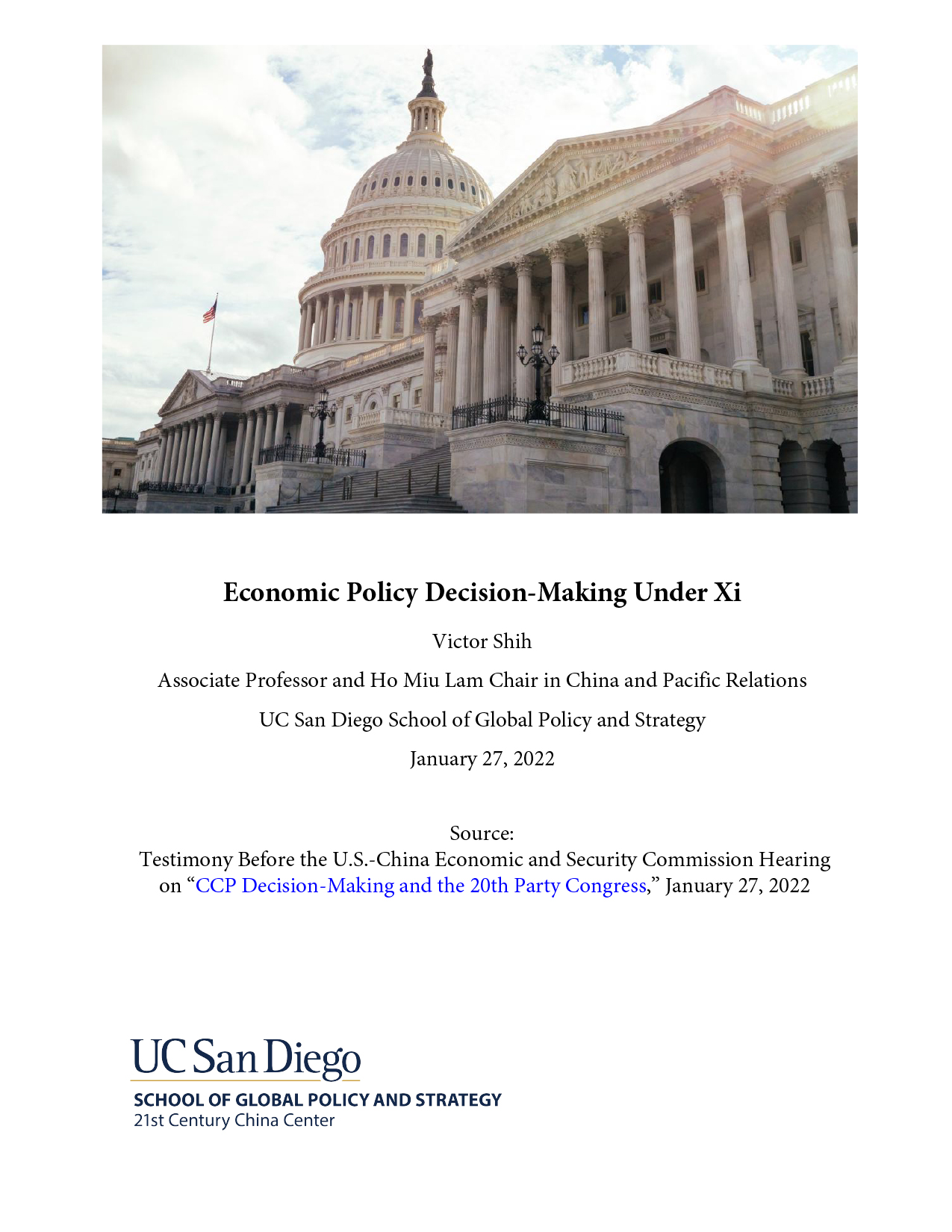
Economic Policy Decision-Making Under Xi
Victor Shih's testimony before the U.S.-China Economic and Security Commission hearing on “CCP Decision-Making and the 20th Party Congress”
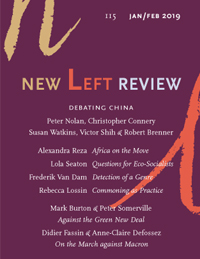
China’s Credit Conundrum
Interviewed by Robert Brenner, Victor Shih discusses the one-off factors that enabled China’s rise as workshop of the world and its subsequent dependence on state credit as driver of growth. Contradictions between the conditions for political and financial stability, as the Xi regime superintends an unsteady slowdown.
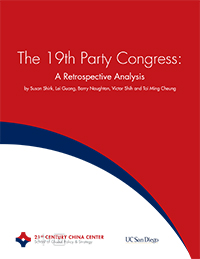
The 19th Party Congress: A Retrospective Analysis
Following the conclusion of the Congress, we now offer a few brief observations about the immediate outcomes of the meeting.
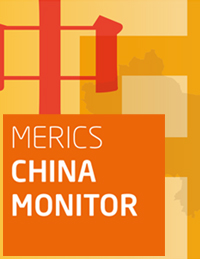
Financial Instability in China: Possible Pathways and Their Likelihood
Victor Shih predicts the likely outcomes of financial instability in China on the MERICS China Monitor
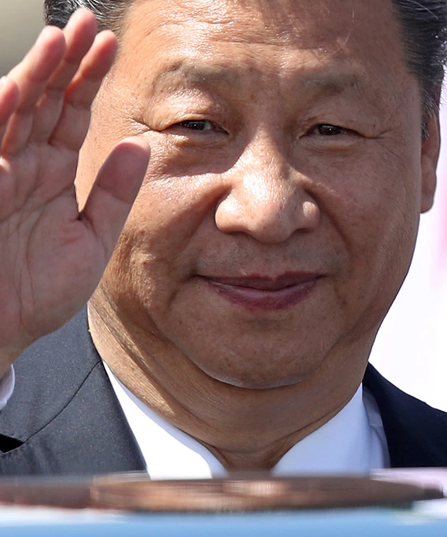
1.3 Billion People Are in One Man’s Grip
Victor Shih and Jude Blanchette: "1.3 Billion People Are in One Man’s Grip," Foreign Policy, Oct. 16, 2017
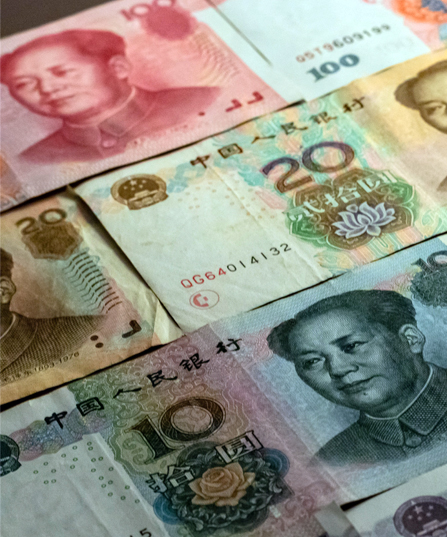
The General Secretary’s Extended Reach: Xi Jinping Combines Economics and Politics
Barry Naughton: "The General Secretary’s Extended Reach: Xi Jinping Combines Economics and Politics," China Leadership Monitor, Sept. 11, 2017
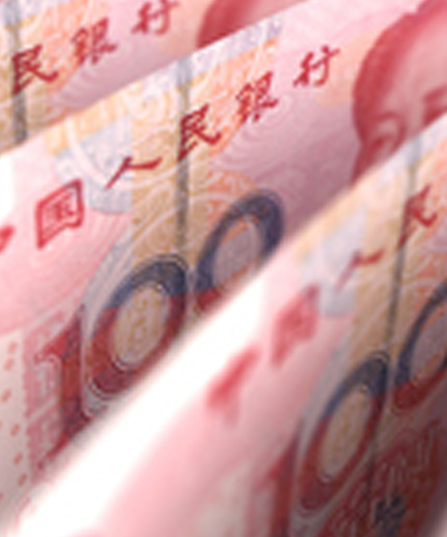
The Regulatory Storm: A Surprising Turn in Financial Policy
Barry Naughton: "The Regulatory Storm: A Surprising Turn in Financial Policy," China Leadership Monitor, May 25, 2017
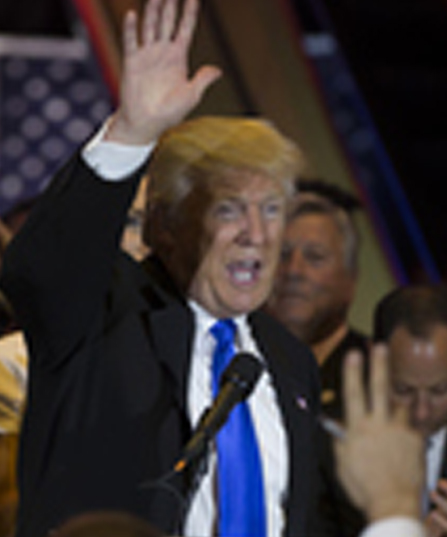
Xi Jinping’s Economic Policy in the Run-up to the 19th Party Congress: The Gift from Donald Trump
Barry Naughton: "Xi Jinping’s Economic Policy in the Run-up to the 19th Party Congress: The Gift from Donald Trump," China Leadership Monitor, Feb. 14, 2017

Trump and China: Getting to Yes with Beijing
Susan Shirk: "Trump and China: Getting to Yes with Beijing," Foreign Affairs, March/April 2017
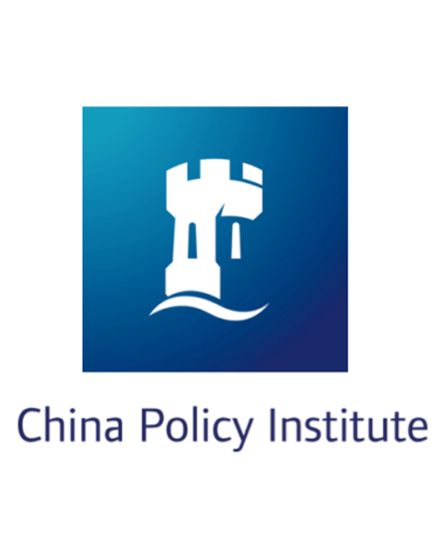
The Rise of the Chinese National Security State Under Xi Jinping
Tai Ming Cheung: "The Rise of the Chinese National Security State Under Xi Jinping," China Policy Institute Analysis, Dec. 15, 2016
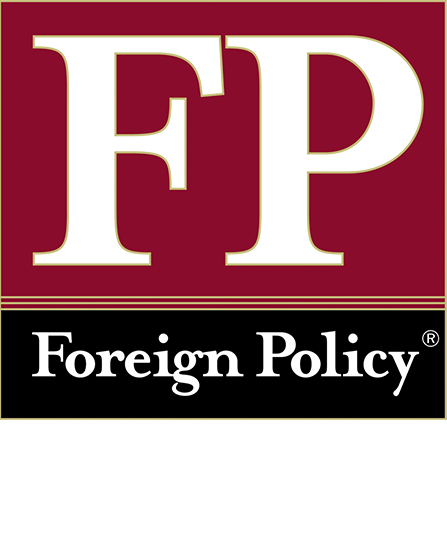
To Renminbi Or Not to Renminbi?
Victor Shih and Susan Shirk: "To Renminbi Or Not to Renminbi?," Foreign Policy, Oct. 18, 2012 (subscription required)





